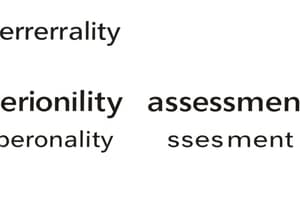Podcast
Questions and Answers
What does the criterion keying approach primarily focus on when developing a test?
What does the criterion keying approach primarily focus on when developing a test?
- The average scores of lower and upper groups
- Distinguishing items that are answered differently by specific groups (correct)
- Ensuring questions are universally applicable
- The aesthetic quality of test items
Which aspect of the Minnesota Multiphasic Personality Inventory (MMPI) has become controversial in recent years?
Which aspect of the Minnesota Multiphasic Personality Inventory (MMPI) has become controversial in recent years?
- Its length and complexity
- The distinctness of diagnostic categories (correct)
- The true-false format of the inventory
- Its original method of item selection
Why is continuous effort important in the creation of personality tests?
Why is continuous effort important in the creation of personality tests?
- To enhance their construct and discriminant validity (correct)
- To maintain their popularity among clinicians
- To ensure they reflect current cultural trends
- To increase the number of questions over time
Which phrase best describes the main goal of the MMPI's development?
Which phrase best describes the main goal of the MMPI's development?
What is a significant consequence of the evolving understanding of psychiatric diagnoses in relation to the MMPI?
What is a significant consequence of the evolving understanding of psychiatric diagnoses in relation to the MMPI?
What does construct validity in personality tests aim to measure?
What does construct validity in personality tests aim to measure?
How does the MMPI determine which items to include for specific diagnoses?
How does the MMPI determine which items to include for specific diagnoses?
What does the process of improving personality tests require?
What does the process of improving personality tests require?
What is the primary focus of the rational or theoretical approach to assessment?
What is the primary focus of the rational or theoretical approach to assessment?
Which aspect is crucial for a measure to be considered useful in the rational approach?
Which aspect is crucial for a measure to be considered useful in the rational approach?
What do reaction times in implicit assessments indicate about a person's sense of self?
What do reaction times in implicit assessments indicate about a person's sense of self?
What distinguishes the empirical or data-based approach from the rational approach?
What distinguishes the empirical or data-based approach from the rational approach?
Which of the following best distinguishes subjective measures from objective measures?
Which of the following best distinguishes subjective measures from objective measures?
What is one of the main outcomes of using the empirical approach to assessment?
What is one of the main outcomes of using the empirical approach to assessment?
In the motive approach to personality, what is a significant aspect of implicit assessment techniques?
In the motive approach to personality, what is a significant aspect of implicit assessment techniques?
In the context of personality assessments, what is construct validity?
In the context of personality assessments, what is construct validity?
What is a primary requirement for all behavior assessment techniques as highlighted in the content?
What is a primary requirement for all behavior assessment techniques as highlighted in the content?
What is a common characteristic of measures developed using the criterion keying approach?
What is a common characteristic of measures developed using the criterion keying approach?
How do self-reports typically differ from objective measures?
How do self-reports typically differ from objective measures?
Which statement best describes the majority of personality measurement devices available today?
Which statement best describes the majority of personality measurement devices available today?
What defines the role of data in the empirical approaches to assessment development?
What defines the role of data in the empirical approaches to assessment development?
Which method would NOT be considered an implicit assessment technique?
Which method would NOT be considered an implicit assessment technique?
In the context of personality tests, what does criterion keying primarily focus on?
In the context of personality tests, what does criterion keying primarily focus on?
What is a potential drawback of using self-reports in personality assessments?
What is a potential drawback of using self-reports in personality assessments?
Flashcards
Criterion Keying Approach
Criterion Keying Approach
A method of test development where items distinguishing between groups (like a criterion group and others) are selected.The items chosen are those answered differently by one group compared to another.
MMPI-2
MMPI-2
A long true-false personality inventory designed to assess abnormality. The original (MMPI, 1943) was revised in 1989 and is used broadly for psychological assessment.
Construct Validity
Construct Validity
The extent to which a test actually measures what it's intended to measure.
Discriminant Validity
Discriminant Validity
Signup and view all the flashcards
Test Revision and Standardization
Test Revision and Standardization
Signup and view all the flashcards
Psychiatric Diagnosis
Psychiatric Diagnosis
Signup and view all the flashcards
Criterion Group
Criterion Group
Signup and view all the flashcards
Elevated Scores
Elevated Scores
Signup and view all the flashcards
Rational/Theoretical Approach
Rational/Theoretical Approach
Signup and view all the flashcards
Face Validity
Face Validity
Signup and view all the flashcards
Construct Validity
Construct Validity
Signup and view all the flashcards
Empirical Approach
Empirical Approach
Signup and view all the flashcards
Data-Based Approach
Data-Based Approach
Signup and view all the flashcards
Criterion
Criterion
Signup and view all the flashcards
Categorization
Categorization
Signup and view all the flashcards
Implicit Self Assessment
Implicit Self Assessment
Signup and view all the flashcards
Implicit Assessment Techniques
Implicit Assessment Techniques
Signup and view all the flashcards
Behavior Sample
Behavior Sample
Signup and view all the flashcards
Subjective Measures
Subjective Measures
Signup and view all the flashcards
Objective Measures
Objective Measures
Signup and view all the flashcards
Observer Ratings
Observer Ratings
Signup and view all the flashcards
Self-Reports
Self-Reports
Signup and view all the flashcards
Study Notes
Personality Assessment
- Personality assessment is the measuring of personality
- It's an informal process used daily to understand people
- Psychology uses formal assessment with techniques like observer ratings
Sources of Information
- Observer Ratings: Measurements of personality from someone other than the person being assessed.
- Self-reports: People describing their own personalities.
- Implicit assessments: Measures not directly asking the person, but instead judging based on responses to tasks.
Reliability of Measurement
- Reliability refers to the consistency or repeatability of the measurement
- Problems/issues of reliability in personality assessment are present through differing items, errors in devices, human factors and many observers.
- Ways to improve reliability include making multiple measurements to cancel out the errors,
- using slightly different measuring devices
- using different angles.
- Ways to improve reliability include making multiple measurements to cancel out the errors,
- Internal Consistency: assesses consistency within a set of items
- Use multiple items to reduce error
- Correlate items or halves to ensure similarity, (i.e. Split-Half-Reliability)
- Inter-rater Reliability: Evaluates consensus among raters.
- Consistency among observers
- Test-Retest Reliability: Assesses consistency over time (repeat measurement).
- similar results over several testings.
Validity of Measurement
- Validity is whether the measurement truly measures the intended concept.
- Construct Validity: A measure assessing the concept/trait the psychologist has in mind. Includes several different categories.
- Criterion Validity: A measure's correlation (relationship) to other known measures / indicators of the characteristic.
- Convergent Validity: A measure relating to similar, but different characteristics.
- Discriminant Validity: A measure unrelated to characteristics it should not be related to. This helps control for other factors that might affect the measure.
- Face Validity: The apparent "face-value" of a measure, whether it looks like it measures what it's supposed to. Often a less important aspect of a measure.
Cultural Validity
- Cultural differences: The assessment procedures and instruments used might have different meanings in different cultures
Response Sets
- Acquiescence: A tendency to agree - this is a response set
- Social Desirability: A tendency to portray oneself in a socially favorable light
Studying That Suits You
Use AI to generate personalized quizzes and flashcards to suit your learning preferences.




